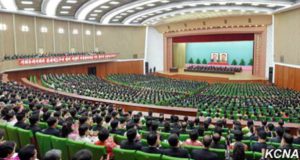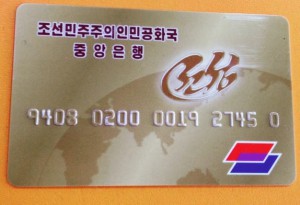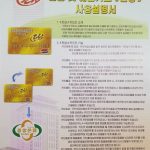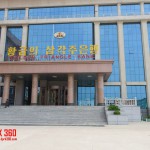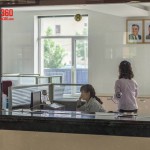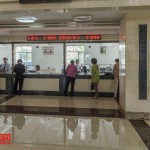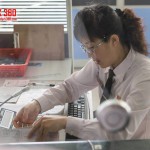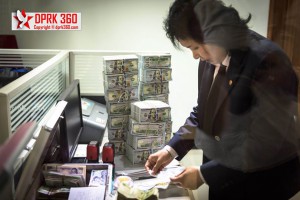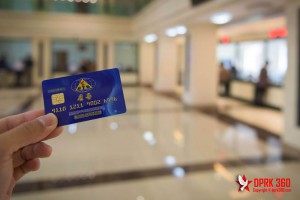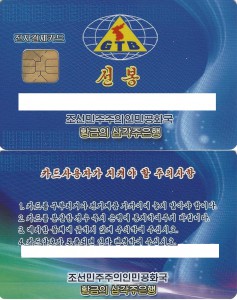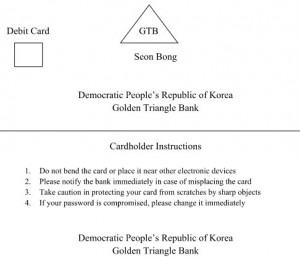In 2011, Kaesong workers officially received their 5th consecutive annual pay increase. In 2012, they “received” their 6th consecutive pay increase. In 2013 there was no pay increase because Pyongyang closed the complex down in a dispute with the South Koreans. In 2014, work resumed at the complex and Kaesong workers “received” a 5% pay increase, but Pyongyang wanted a 10% to make up for the 2013 year (in which they closed the complex). Now it looks like Pyongyang is raising tensions (unjustifiably in my opinion) to recover a “pay increase” they feel they are owed.
For those new to this topic, I should point out that we are not talking about wages paid to North Korean workers. We are talking about US dollar balances (cash) that are given directly by South Korean firms to the North Korean government. The North Korean government keeps all of the hard currency and pays its workers in local currency. That said, The North and South Koreans still officially refer to “wages” (even though they are nothing of the sort), so I will as well.
I am chronicling this developing story in periodic updates below.
____________________
UPDATE 21 (2015-12-26): Two Koreas conclude Kaesong fee negotiation. According to the Joong Ang Ilbo:
The two Koreas concluded a 13-month negotiation process on Thursday regarding the amount South Korean companies should pay North Korea for their use of land at the Kaesong Industrial Complex (KIC).
According to the Ministry of Unification, the two sides agreed that South Korean companies will pay a fee of 64 cents per 1 square meter (10.76 square feet). An official agreement was signed between the Kaesong Industrial District Management Committee of the South and North Korea’s Central Special Zone Development Guidance General Bureau.
Pyongyang had demanded $1 per 1 square meter throughout the negotiation, which began in November 2014, while the South insisted on the rate of 50 cents.
An official from the Ministry of Unification said that Seoul presented several international precedents to persuade Pyongyang and cited the operations model at the Samsung Electronics factories in the Yen Phong Industrial Zone in Vietnam.
According to the source, Samsung Electronics pays 50 cents per 1 square meter for its smartphone factory in Vietnam. Qingdao Sino-German Ecopark charges in the range of 64 cents.
“The land usage fee was settled based on the peculiar nature of the KIC, international standards and the financial considerations of the companies,” the official said. “It serves the goal of improving the global competitiveness of the industrial zone.”
Kim Yong-hyun, a North Korean studies professor at Dongguk University, said the deal was meaningful in that Pyongyang had remained flexible when Seoul presented international norms.
…
The companies were exempt from paying a land usage fee until the end of this year. While the North demanded that the South pay the fee for all the land that was supposed to be developed under the deal, Seoul insisted that it pay only for the land on which the businesses actually operate.
After more than a year of negotiations, the North accepted the South’s argument and decided to levy the fee for only the 920,000 square meters of the land used out of the complex’s total 3.3 million square meters.
UPDATE 20 (2015-8-17): Reuters reports that the Koreas have worked out a deal. According to the article:
North and South Korea agreed to increase the minimum wage for North Korean workers at a joint factory park by 5 percent, a South Korean industry representative said, ending a months-long dispute despite heightened tensions on the Korean peninsula.
The compromise, reached Monday, raises the monthly wage to $73.87 at the Kaesong Industrial Complex, which is just north of the heavily fortified inter-Korean border.
“The fact that dialogue between South and North met with good results is welcomed and a good signal for stable management in Kaesong,” Yoo Chang-geun, vice chairman of the Corporate Association of Kaesong Industrial Complex, said on Tuesday.
…
The new wage is slightly below the $3.65 increase, or 5.18 percent, North Korea had demanded, which exceeded the annual increase of 5 percent agreed when the zone was established.
Here is coverage in Yonhap:
South and North Korea have agreed to hike the minimum wage by 5 percent for North Korean workers at a joint industrial park in the North, a government official said Tuesday, a move that will help resolve a monthslong row.
The two Koreas have been embroiled in a dispute following North Korea’s unilateral decision to hike the minimum wage by 5.18 percent for the about 55,000 North Korean workers at the Kaesong Industrial Complex in the North’s border city of the same name.
The quasi-state committees from the two Koreas reached an agreement on Monday to hike the wage to US$73.87, the most contentious issue in the dispute, according to a ranking official at the Unification Ministry. A 5 percent hike is the same level at which the wage has been increased every year so far.
“The most pressing issue of the wage cap has been resolved though there is still a long way to go,” the official said, asking not to be named. “But the move is expected to support the stable supply of labor and improve business conditions.”
The move is expected to raise the total monthly wage by far more than 5 percent when other compensation is included, according to an official at the group of 124 South Korean firms that are running factories in the park.
…
Seoul has rejected Pyongyang’s unilateral move to hike the wage, saying that it breaches a 2004 agreement that calls for the two sides to set wages through consultations.
In July, the two sides held talks of the joint committee that operates the complex, the first since June last year, but they failed to reach an agreement.
The ministry said that the two Koreas plan to hold a meeting of the committee to discuss how to revise labor guidelines.
The government official said that the two sides have agreed to continue to set the wage cap through consultations.
“By taking into account the grave situation facing inter-Korean ties, the government plans to take measures to develop the complex,” the official said.
According to UPI:
The agreement also covers social welfare for North Korean factory workers in Kaesong. Taken together, the payment of workers’ health insurance and other benefits indicates total income is to increase between 8 and 10 percent.
Coverage for North Korean workers is to include provisions for work-related injuries, death insurance and unemployment benefits.
Workers also are to be compensated for hours worked overtime and for holidays at a rate that is between 50 to 100 percent of regular hours worked, according to South Korean officials.
Ongoing tensions between the two sides have affected business operations in Kaesong but productivity at the complex has soared dramatically despite the wage dispute.
From January to April, production value was estimated to have reached $186 million, up 25 percent from $148 million from the same period in 2014.
Here is information in the New York Times:
The Kaesong wage issue has been a subject of negotiation between the Koreas since February. On Tuesday, officials at South Korea’s Unification Ministry, who spoke at a news briefing on the condition of anonymity, said that workers’ monthly minimum wage would be raised 5 percent, to just under $74. The North had wanted an increase of 5.18 percent.
The Kaesong park is a significant source of hard currency for the impoverished North. Workers there earn a monthly average of $166, including overtime compensation. The South pays the wages directly to the North Korean government; how much each worker actually receives is unknown.
None of the media highlighted that nearly all increased spending on North Korean workers at the Kaesong Industrial Complex is simply a larger transfer to the North Korean government will little going to the actual workers themselves.
UPDATE 19 (2015-8-14): North Koreans at the Kaesong Industrial Complex already “paid” more than workers at other foreign-owned ventures. According to Radio Free Asia:
Local employees hired by foreign-invested companies inside isolated North Korea are earning much less than their counterparts who work at South Korean firms inside the Kaesong Industrial Complex, businessmen with knowledge of the situation said.
Foreign-invested companies pay local employees less than the U.S. $70.35 monthly minimum wage paid to the 53,000 North Koreans who work at the Kaesong Industrial Complex, the joint inter-Korean economic project north of the demilitarized zone, sources said.
Some North Koreans who work at the industrial park receive more than U.S. $140 a month when overtime is included, they added.
A Chinese-Korean businessman who operates a roofing material company and metal pressing company in the Rason area on the northeast tip of the country told RFA’s Korean Service that he pays his North Korean workers about 300 Chinese yuan (U.S. $47) a month. Other Chinese companies in Rason pay similar wages to their North Korean employees, he said.
A Chinese businessman who employs about 100 North Koreans at a mine he is developing in Hwanghae province said he pays his workers U.S. $60-$70 a month.
“There might be some wage differences at other foreign companies, but they are not that much different from the level of wages I pay,” he said.
The sources noted that some media reports published outside North Korea put the average monthly wage of workers in the Rason Special Economic Zone, set up by the North Korean government in the early 1990s to promote economic growth through foreign investment, at around U.S. $100. But this contradicts salary information provided by the foreign companies doing business there, they said.
“It’s a big problem paying the same wage rates to the workers dispatched unilaterally by the North Korean authorities [to foreign-invested companies inside the country] without determining whether they’re skilled or unskilled, or taking into consideration if they are men or women, based on the nature of the work they’re supposed to do,” one source said.
While those who work for foreign-invested companies in North Korea also receive an allowance for one meal per day, the sources said, they also log fewer hours than their Kaesong counterparts, because they often fail to report for work whenever authorities order labor mobilizations or electricity supplies are low.
UPDATE 18 (2015-7-17): The talks ended with no resolution. According to Yonhap:
South and North Korea on Thursday failed to settle their months-long dispute over wages of North Korean workers employed at their joint factory park in rare inter-Korean talks held in the communist country.
Delegations from Seoul and Pyongyang sat together in the North Korean border town of Kaesong earlier in the day over the tangle, which started with the North’s unilateral decision in February to hike the minimum wage for about 55,000 North Korean laborers.
The North demanded the per-hour minimum wage be lifted by 5.18 percent to US$74, but the South had resisted the steeper-than-agreed hike before the two countries agreed last week to settle the issue through dialogue.
The ground rules set when the joint cooperation project opened in 2004 capped the maximum rate of wage increase at 5 percent per year.
The meeting ended without any major progress as the two sides failed to narrow gaps on the wage issue, a South Korean official said after the talks broke down.
The two sides intend to meet again to put the issue to renegotiation, although a date has not been set, he noted.
Pak Chol-su, a vice director of North Korea’s special economic zone development department, who heads the North Korean delegation, had earlier expressed hopes for a favorable outcome as the negotiations kicked off inside the Kaesong complex.
Touching on the severe drought reported in the North, Pak also said recent rainfalls “pretty much improved harvest.”
The Thursday meeting marks a rare opportunity of inter-Korean contacts with the countries mired in long-running military and diplomatic tensions.
It was the first meeting of their joint committee in charge of running the Kaesong Industrial Complex since the last one was held in June last year. It was also the first government contact between the countries following a working-level military dialogue convened in October in 2014.
Amid the bellicose mood, the North abruptly called off U.N. Secretary-General Ban Ki-moon’s planned peace-promoting visit to the Kaesong park in May.
The joint factory park, the result of the first-ever inter-Korean summit in 2000, is the last remaining symbol of once-vibrant inter-Korean reconciliation. It has also served as a core source of foreign currency for the cash-strapped North, while providing South Korean companies with a cheap but skilled workforce.
A total of 124 South Korean firms, mostly small- and medium-sized manufacturers, run factories at the complex under the auspice of the South Korean government.
The operation of the complex has been a yardstick of ups and downs for inter-Korean ties.
In April 2013, the North unilaterally shut down the park for about four months amid worsening tensions on the peninsula.
Since the unilateral wage hike demand in February, the countries agreed to tentatively freeze the minimum wage at the current $70.35 level, allowing the two sides to buy time for talks on the wage issue.
Also discussed in the Thursday meeting was how to tighten public order among South Koreans moving in and out of the complex.
The North has vowed to take punitive actions on South Koreans who are caught carrying banned goods into the North including USB memory sticks or newspapers from the outside world.
Here is coverage in the Daily NK. Here is coverage in the Joong Ang Ilbo.
UPDATE 17 (2015-7-9): Two Koreas to hold talks to negotiate Kaesong wage issues. According to Yonhap:
South and North Korea plan to hold talks on a joint industrial park in the North next week to discuss a prolonged dispute over the North’s unilateral move to raise wages for its workers at the complex, Seoul officials said Thursday.
North Korea has accepted the South’s offer for holding the meeting at the Kaesong Industrial Complex next Thursday at the border city of the same name, according to the unification ministry.
The move raises hopes for resolving a months-long wage row between the two Koreas following Pyongyang’s unilateral bid to hike the minimum wage by 5.18 percent to US$74 per month for about 55,000 North Korean workers at the park. A total of 124 South Korean small- and medium-sized enterprises are operating factories there.
The South has rejected the communist neighbor’s move, saying it is in breach of a 2004 agreement that calls for the two sides to set wages through consultations. The wage cap has been set at 5 percent per year.
In August 2013, the two Koreas decided to set up a joint committee in charge of running the industrial park following the North’s unilateral move in April of that year that shut down the park for about four months.
The committee is an integral part of a deal that called for reopening the complex and adopting safeguards to prevent any work stoppages in the future. The committee has not met since June last year due to the North’s refusal.
The joint factory park, which opened in 2004, is the last remaining symbol of inter-Korean reconciliation. It has served as a major revenue source for the cash-strapped communist North, while South Korea has utilized cheap but skilled North Korean laborers.
In what could be a temporary relief, North Korea accepted South Korea’s tentative offer in late May to pay wages at the current level of $70.35, but Seoul and Pyongyang have yet to resolve the issue fully.
Meanwhile, the ministry said that Pyongyang has sent a notice to Seoul saying that it will tighten its surveillance over South Koreans moving in and out of the complex.
The North is known to have expressed complaints over South Koreans bringing in goods, such as mobile phones and newspapers, that are restricted in the North, vowing to take punitive actions if found.
In response, the South said that the issue should be dealt with in accordance with the two sides’ agreement and related regulations, according to the ministry.
UPDATE 16 (2015-5-25): South Korean firms begin paying regular wages, though the matter is still not resolved. According to Yonhap:
South Korean firms in an inter-Korean factory park in North Korea plan to pay wages to their North Korean employees this week, a government official said Monday.
The move came days after Pyongyang accepted Seoul’s tentative offer of wage payments for North Korean workers at the factory park in North Korea’s border city of Kaesong at a previously agreed level until separate consultations are held.
The deal on Friday would allow South Korean firms to pay the wage based on the US$70.35 per month that was originally set. But it called for the 124 South Korean firms to provide retroactive pay based on the outcome of separate consultations.
The official said North Korea demanded that South Korean firms in Kaesong pay March and April wages by the end of this month. The official asked not to be identified, citing policy.
The sides have yet to produce a deal over the more sensitive issue of a wage cap, which has been set at 5 percent per year.
In February, North Korea unilaterally decided to hike the minimum wage by 5.18 percent to US$74 per month for about 53,000 North Korean workers in the factory park.
The factory park, an outcome of the first-ever inter-Korean summit of leaders in 2000, is a major symbol of reconciliation between the rival Koreas.
It combines South Korean capital and technology with cheap North Korean labor to produce clothes, utensils, watches and other labor-intensive goods.
The factory park is a major source of hard-currency for the impoverished north.
UPDATE 15 (2015-5-22): Koreas buy time for talks on wage at factory park. According to Yonhap:
North Korea has accepted South Korea’s tentative offer of wage payments for North Korean workers at a joint industrial park, allowing the two sides to buy time for talks on Pyongyang’s unilateral wage hike, officials said Friday.
The two Koreas have been embroiled in the wage dispute as North Korea unilaterally decided in February to the hike minimum wage by 5.18 percent to US$74 per month for about 53,000 North Korean workers at the Kaesong Industrial Complex in the border city of the same name.
The agreement between the quasi-state committees from both sides will allow South Korean firms to pay the wage based on the $70.35 per month that was originally set, according to government officials. Then, the 124 South Korean firms will provide retroactive pay.
Friday’s deal is not final as the two Koreas have not produced a breakthrough over the more sensitive issue of a wage cap. But the North has accepted Seoul’s offer to pay the wage at a previously agreed level until separate consultations are held.
Seoul has rejected the North’s unilateral move, saying that the North violated a 2004 agreement that calls for the two sides to set wages together. The wage cap has been set at 5 percent per year.
“The move will ease concerns about production setbacks that could be sparked by North Korean workers’ threat not to work or to seek a work slowdown,” the Ministry of Unification said in a statement.
It added that the government will make efforts to resolve the wage dispute as soon as possible through talks with North Korea.
The agreement came amid concerns about the strained inter-Korean ties following North Korea’s recent abrupt cancellation of its invitation for U.N. Secretary-General Ban Ki-moon to visit the industrial complex.
On the same day a group of businessmen visited the KIC to help resolve the impasse. According to Yonhap:
A group of South Korean businessmen visited a joint industrial complex in North Korea Friday amid a drawn-out row over wage payment for North Korean workers there, an official from the group said.
The two Koreas have been embroiled in the wage dispute as North Korea unilaterally decided in February to hike monthly wages by 5.18 percent for about 53,000 North Korean workers at the Kaesong Industrial Complex in the border city of the same name. Seoul has rejected the North’s unilateral move.
The group of South Korean businessmen with factories there visited the complex in an effort to resolve the prolonged dispute as the 10-day period of the wage payment for April began Sunday. They made similar visits three times before.
The visit came as North Korea abruptly canceled its invitation for U.N. Secretary-General Ban Ki-moon to visit the industrial park, dampening hopes for better inter-Korean ties.
The joint industrial park, which opened in 2004, is the last remaining symbol of inter-Korean reconciliation following a landmark inter-Korean summit in 2000. It has served as a revenue source for the communist country while South Korea has utilized cheap but skilled North Korean labor.
Seoul said that Pyongyang violated a 2004 agreement that calls for the two sides to set the wages together. The wage cap has been set at 5 percent per year.
In August 2013, the two Koreas also decided to set up a joint committee in charge of running the complex following the North’s unilateral move to shut down the park for about four months in April of that year.
Seoul has requested its companies not to send out paychecks, vowing to punish violators. But despite the warning, about 50 out of 124 South Korean companies have paid March wages to the North’s workers apparently after threats from the North.
Here is coverage in Xinhua.
UPDATE 14 (2015-5-19): Kaesong companies pass resolution opposing North’s unilateral wage raise. According to the Hankyoreh:
Kaesong Industrial Complex tenant companies reached an agreement not to accept North Korea’s unilateral demands to increase wages. Instead, they agreed to provide the North Korean authorities with a letter of guarantee to pay the difference in the wages once North and South Korean negotiators reach an agreement.
During a general meeting of the Corporate Association of Gaeseong Industrial Complex (CAGIC) on May 18, with about 90 tenant companies attending, a group of company chairs approved a letter of guarantee they had proposed providing to the North Korean Bureau of Central Special District Development.
On May 15, the association chairs visited Kaesong to meet Park Chol-su, deputy chief of the bureau, and offered to write a letter of guarantee. The letter would state that the companies refuse to accept North Korea’s request to raise wages but promise to retroactively pay the difference in the wages and the late fees according to the agreement that North and South Korean authorities eventually reach.
On Apr. 20, the deadline for paying the wages for March, the North Korean bureau had asked the South Korean tenant companies to sign a letter of guarantee in which they would effectively acknowledge the wage increase on which it had unilaterally decided and agree to pay the ensuing late fees. Reportedly, five companies agreed to this demand.
In order to prevent South Korean companies from giving in to North Korea’s demands for raising wages, the South Korean government asked them to first deposit workers’ wages with the South Korean management committee, which would then forward the payment to the North Korean bureau.
The government is putting pressure on tenant companies, threatening that it will not extend the loan repayment schedule for companies that do not obey these instructions. Tenant companies were loaned emergency operating funds when the complex temporarily shut down in 2013.
“During a meeting with the group of company chairs on May 17, the Unification Minister said that, if we can show that the companies are not agreeing to North Korea’s demand to raise the wages, the Ministry might not predicate extending the loan repayment schedule on depositing workers’ wages with the management committee,” CAGIC Chairman Chung Ki-sup told reporters after the general meeting on Monday.
“In order to comply with this, we reached an agreement in the general meeting today to pay North Korea the April wages according to the February rates, before North Korea had asked for a wage increase.”
This past February, North Korea notified South Korea that it would be unilaterally increasing the minimum wage of North Korean workers at the Kaesong complex by 5.18% from US$70.35 to US$74 a month beginning with the March wages.
49 of the 125 tenant companies had paid the wages to North Korea as of May 8. The South Korean government is currently investigating to see whether these companies used double bookkeeping to pay their wages at the level North Korea demanded.
The South Korean government has insisted on raising the minimum wage no more than 5% through deliberations between North and South, as the labor regulations stipulated before North Korea unilaterally revised them.
On May 15, the South Korean government sent a message to North Korea through the secretariat of the Inter-Korean Joint Committee on the Kaesong Complex proposing that the committee hold its sixth meeting on May 20, but North Korea again refused to receive the message.
The joint committee was set up after operations at the complex were suspended for five months in 2013 in order to prevent the reoccurrence of such a shutdown. The committee is supposed to convene every quarter, but last year, only one meeting was held.
UPDATE 13 (2015-5-14): The North Koreans have issued a statement that tried to tie the Kaesong wage increase to revision of domestic labor regulations rather than a unilateral action against South Korea. According to KCNA:
New Labor Regulations to Be Invariably Enforced in KIZ
Pyongyang, May 14, 2015 09:56 KST (KCNA) — The Presidium of the Supreme People’s Assembly of the DPRK revised the labor regulations and promulgated them in November last year in conformity with the development of industrial zones, taking into full consideration the situation in the Kaesong Industrial Zone (KIZ), realities in international special zones, etc.
Pursuant to them, the DPRK notified the south side that a new wage pattern would be applied from March this year so that businesses of the south side might be fully ready for the new regulations.
In consideration of conditions of businessmen, the DPRK took such generous measure as extending the date of wage payment for March a week.
Nevertheless, the south Korean authorities, far from thanking the DPRK for its good faith and generosity, pulled up it over its legitimate enforcement of legislation, terming it “unilateral one violating the north-south agreement.” Not content with this, they are threatening and blackmailing the businesses to prevent them from paying the wages for March while making investigations into them.
A spokesman for the General Bureau for Central Guidance to the Development of the Special Zone declared in a statement on Wednesday the KIZ is an economic special zone being operated together with businessmen of the south side and that the south Korean authorities, therefore, have neither reason nor pretext to interfere in it.
We cannot but take a serious note of the fact that the south Korean authorities are set to apply a “deposit” system to wage payment from April, something rare to be found in economic zones of other countries, in a crafty bid to use the businessmen for wantonly violating the laws and regulations in the KIZ and openly encroaching upon the sovereignty of the DPRK, the statement noted, and went on:
Businessmen of the south side should keep vigilance against this move so that they may not be scapegoats for the authorities’ plot to wantonly violate the DPRK’s laws and regulations in the KIZ, an encroachment upon its sovereignty.
They should seriously think once again over what they would gain by yielding to the pressure of the authorities to turn the KIZ into the one of factories without workers where business autonomy is seriously violated.
Explicitly speaking, the issue of enforcing the new labor regulations is not an issue to be discussed at the talks between authorities as it is an issue concerning the DPRK’s legitimate enforcement of legislation.
The south Korean authorities should stop at once putting the brake and pressure upon the businesses’ autonomous management in the KIZ and deliberately laying an obstacle in the way of the operation of the KIZ and ensure their free management.
Not only the south Korean authorities but also the commission responsible for the management of the KIZ are to blame for the situation prevailing in the zone.
If the management commission continues working hard to infringe upon the inviolable sovereignty of the DPRK, making the KIZ a political bargaining chip for someone under the manipulation of the south Korean authorities, departing from its mission, the DPRK will call it into question for the ensuing serious consequences and it would not be possible for the DPRK to entrust the management of the KIZ to the commission.
The KIZ is, in actuality, a zone for north-south economic cooperation, not a theater for confrontation between the authorities of the north and the south.
The DPRK will keep enforcing the new labor regulations for the normal development of the KIZ in the future.
UPDATE 12 (2015-4-21): Pyongyang has allowed normal wages to be paid for March of 2015. According to the Hankyoreh:
“The North said it would allow the payment of the regular wages for now and calculate the difference from the hike later,” explained Corporate Association of Gaeseong Industrial Complex chairman Chung Ki-sup in a telephone interview with Hankyoreh on Apr. 20. That day marked the deadline for payment of March wages to North Korean workers at the complex.
North Korea recently announced a unilateral 5.18% hike in the minimum wage at the complex, which would raise monthly pay from US$70.35 to US$75.00. The South Korean government has blocked tenant companies from complying on the grounds that a unilateral increase beyond the agreed-upon 5% ceiling is unacceptable.
Chung explained that North Korea “wants us to sign statements confirming the unpaid difference.”
“Wage payments were already made over the course of ten days, so late fees for the difference are being deferred until this weekend,” he added.
The agreement buys a few extra days for authorities on both sides to discuss the matter before additional frictions erupt over the minimum wage hike at the complex. Tenants companies have reportedly convinced North Korea to accept the earlier US$70.35 minimum wage standard for March pay, with the difference to be paid retroactively after authorities reach an agreement on the matter.
“It appears that North Korea took into account the difficult position the tenant companies are in with the South Korean government insisting that they not pay the extra amount,” Chung explained.
“I don’t think North Korea wants the repercussions of this to grow either,” he said.
A group of tenant company directors at the complex had initially planned to visit Kaesong on Apr. 20 to discuss the wage issue, although the plans were eventually canceled.
“Our biggest concern is out of the way now that the North has agreed to accept the pre-hike pay,” Chung said. “My understanding is that the visit was canceled because they concluded it wasn’t going to really fix matters as they stand now.”
UPDATE 11 (2015-4-20): Kaesong firms stuck between Korean governments. According to Arirang News:
South Korea’s Kaesong business owners are stuck in a dilemma.
On the one hand, they’re facing the prospect of having to pay a late fee if they don’t comply with the North’s demand for a wage hike, but on the other hand, they face the possibility of punitive measures from the South if they do.
None of the 124 South Korean companies have paid the March wages yet, which are due April 20th.
North Korea has threatened to impose a late fee of 15 percent per month if the South Korean companies don’t issue the wage payments on time.
South Korea says it will not accept the North’s unilateral demand for a wage hike, saying Pyongyang violated a 2004 agreement that calls for two quasi-governmental committees to set the pay rate together.
The two committees met for a second time on Saturday, but failed to reach a compromise.
In addition, Seoul has warned the South Korean companies operating in the complex that they will face punitive measures if they concede to the North’s wage hike demands.
The two Koreas have been at odds over the issue since February, when the North unilaterally decided to raise the wage level by more than 5 percent to roughly 74 U.S. dollars a month starting in March for the approximately 53-thousand North Korean workers in the complex.
Seoul’s Unification Ministry says it is still sending messages to Pyongyang asking to meet on the wage issue, but the North maintains that it’s a matter for Pyongyang to decide.
Yonhap reports that a few South Korean firms have made increased payments in accord with Pyongyang’s demands:
Three South Korean firms have paid more wages for North Korean workers in the Kaesong Industrial Complex as Pyongyang demanded, a government source here said Monday.
Their move runs counter to the South Korean government’s firm stance not to accept the communist neighbor’s unilateral decision to raise wages for its 53,000 workers in the North’s border town.
The North unilaterally decided to raise the minimum wage by 5.18 percent to US$74 per month, starting in March, for those workers employed by the 124 South Korean small- and medium-sized firms in the Kaesong zone.
Three of the firms paid the increased wages, the source said. They are expected to face administrative punitive action from Seoul’s government.
The South’s unification ministry, meanwhile, dismissed news reports that the North extended a deadline for the payment of the March wage.
UPDATE 10 (2015-4-15): Seoul hints at drawn-out row over Kaesong wage problem. According to Yonhap:
South Korea said Monday it will not be restrained by a timetable in resolving an ongoing row over wage hikes for North Korean workers at a joint industrial park in the North.
The two Koreas have been in dispute since the North unilaterally decided in February to raise the wage level by 5.18 percent to US$74 per month starting in March for about 53,000 North Korean workers hired by South Korean companies at the Kaesong Industrial Complex in the North’s border city of the same name.
Seoul is seeking to hold talks with the North over the issue through a quasi-governmental committee as the payday for the March wages, which began Friday, will last for 10 days. None of the 124 South Korean firms have paid March wages to North Korean workers.
Seoul’s unification ministry said that it will do its best to resolve the wage dispute, adding that the row may be prolonged if it passes the deadline.
“As we cannot exclude the possibility that the wage dispute cannot be settled until April 20…the Seoul government will continue to make efforts to resolve the issue,” Lim Byeong-cheol, spokesman at the unification ministry, said at a press briefing.
“What’s important is that the government has the will to tackle this row. We do not prejudge any situations without having a specific deadline in mind.”
Seoul has not accepted the North’s unilateral move, saying Pyongyang violated a 2004 agreement that calls for two quasi-government committees from each side to set the wages together. The wage cap has been set at 5 percent.
Its efforts for the talks have gained urgency as North Korea will take days off on Wednesday and Thursday to mark the April 15 birth anniversary of its late founder, Kim Il-sung.
The industrial complex opened in the early 2000s, the last remaining symbol of inter-Korean reconciliation. It has served as a major revenue source for the cash-strapped communist country.
Lim also called on North Korea to stop threatening to retaliate against a move by Seoul activists to resume their campaign to send anti-Pyongyang leaflets and other materials via balloons across the inter-Korean border.
“It is not desirable for North Korea to criticize Seoul activists’ leaflet launch as it is a matter of freedom of speech,” Lim said. “North Korea should immediately stop making threatening remarks to South Korean people.”
Despite Seoul’s request for restraint, anti-North Korea activist Park Sang-hak on Thursday made an attempt to launch balloons carrying leaflets and copies of DVDs of “The Interview,” a U.S. comedy film about a plot to assassinate North Korean leader Kim Jong-un. His attempt was scuttled by police.
North Korea said Friday it will take “ruthless” actions against Seoul activists’ move, saying that the move to send the U.S. movie to the North is tantamount to a declaration of war against Pyongyang.
UPDATE 9 (2015-4-1): S. Korea not budging on Kaesong wage row (Yonhap):
South Korea said Wednesday it will ask the country’s firms at the Kaesong Industrial Complex in writing not to succumb to North Korea’s pressure to raise wages for its workers.
The unification ministry said it will soon send a formal letter to 124 South Korean firms operating in the zone just north of the inter-Korean border.
The move comes as the companies, mostly small and medium-sized, will begin to pay March’s wages to around 53,000 North Korean employees on April 10.
In February, the North decided unilaterally to revise a set of labor rules that included the elevation of the minimum wage for its workers at the Kaesong Industrial Complex from US$70.35 to $74 starting in March.
The South has rejected the North’s decision, saying the wage issue should be decided through bilateral discussions.
It has urged the South’s firms in Kaesong not to follow the North’s measure.
“We plan to send an official letter to them in order to again make clear the government’s stance on the matter,” Unification Ministry spokesman Lim Byeong-cheol said.
He added there has been no progress yet in efforts to hold talks with North Korea to discuss the issue.
Here is coverage in the Hankyoreh.
UPDATE 8 (2015-3-18): South Korean business owners have crossed into the Kaesong complex to complain about Pyongyang’s unilateral wage increase. According to the Financial Times:
On Wednesday more than a dozen businessmen representing about 120 companies visited Kaesong, about 10km north of the border, to voice their concerns about the move, amid growing concerns about the future of the joint economic project
…
“The unilateral change of labour rules is a problem,” said Chung Ki-sup, head of the council of the South Korean businesses operating in Kaesong, ahead of the 14-member delegation’s arrival in the North. “But this can be easily resolved when dialogue resumes.”
…
Mr Chung said the North’s stance might in part be a reaction to Seoul’s refusal to ban North Korean defectors and rightwing civic groups from sending anti-North leaflets across the border.
Experts say the wage disputes are unlikely to lead to another closure of the industrial complex, but the problems have renewed scepticism over the merits of the project.
“The disputes are unlikely to be resolved anytime soon,” said Park Hyung-joong, researcher at Korea Institute for National Unification. “Pyongyang wants to use Kaesong as a political bargaining chip when inter-Korean relations are not good. So the complex will remain exposed to political problems, but closing it carries too big political risks for both sides.”
Here is coverage in the Daily Mail and Yonhap.
UPDATE 7 (2015-3-17): The DPRK has tried circumventing the South Korean government to reach out to the Kaesong firms themselves. According to Arirang News:
In an unprecedented move, North Korea asked the heads of South Korean companies operating at the inter-Korean industrial complex in Kaesong to gather for a meeting that was scheduled for earlier in the day.
No specifics about the meeting were announced and the South Korean government asked the company heads. not to respond to Pyongyang’s call.
Instead, the South Korean government held a meeting in Seoul this afternoon with most of the leaders of companies from the complex.
Seoul discussed possible countermeasures and urged the leaders not to abide by Pyongyang’s one-sided demands.
Watchers believe the meeting was Pyongyang’s way of pressuring the South Korean companies to go along with its unilateral decision to raise wages for its workers from a little over 70 U.S. dollars to 74 dollars a month and revise labor regulations.
UPDATE 6 (2015-3-12): The DPRK rejects South Korea’s call for talks on Kaesong wages. According to Yonhap:
North Korea claimed Thursday its decision to raise wages for its workers at the Kaesong Industrial Complex is a legitimate measure under its sovereignty, dimming hopes of an early resolution to disputes between the two Koreas over the issue.
The North’s Central Special Development Guidance Bureau, which is in charge of operating the complex, made clear that it is not a matter to be decided through consultations with the South’s government.
Last month, Pyongyang notified Seoul of its unilateral decision to elevate the minimum wage from US$70.35 to $74 starting in March. It also said it would collect 15 percent of their basic wage plus overtime payments as “social security.” Currently, the South’s firms pay 15 percent of the basic wage alone.
The South strongly protested against the decision, suggesting that the two sides hold dialogue on March 13 to discuss the problem.
Officials here emphasized that the two Koreas have agreed to decide every issue related with the operation of the joint venture through mutual consultations.
…
The decision on the wage hike is a “normal and legitimate” exercise of the North’s legislative rights, the bureau’s spokesman told Pyongyang’s propaganda website, Uriminzokkiri.
It’s not a subject for bargaining with the South, he added.
It makes no sense, he added, for the North to hold talks with the South at a time when it is staging a war rehearsal with joint military drills with the United States on the peninsula.
He argued that wages for the North’s workers in Kaesong are still low for their heightened skills and productivity and in comparison with the wage level in special economic zones in other nations.
UPDATE 5 (2015-3-11): Throwing fuel on the fire of this mess, the North and South Koreans are required to resolve real estate rental rates this year. There will be no practical way to resolve this issue independently of the ongoing wage dispute. According to Yonhap:
When the Kaesong Industrial Complex in the North’s border town of the same name started operations in 2004, Seoul agreed with Pyongyang to pay the rent for the North Korean land used by South Korean companies from 2015 after negotiations on the amount.
…
In November, the North’s Central Special Development Guidance Bureau in charge of the industrial complex notified its South Korean counterpart of its intention to start talks on the rent issue, according to the officials.
…
But the negotiations are widely expected to face a bumpy road, given a wide opinion gap shown in the countries’ previous exchanges on the issue.
In 2009, the North attempted to collect up to US$10 of rent per 3.3 square meters of land, but it faced strong opposition from South Korea, so the plan was dropped immediately.
Following the North’s notification in November, Seoul has decided not accept such a level of rent as put forth by the North in 2009, which could further mount the inter-Korean tension over the factory complex down the road, according to the officials.
The joint Kaesong factory park is already at the center of an inter-Korean feud after the North announced last month its unilateral decision to raise the minimum wage of North Korean workers in the park from US$70.35 to $74 starting with their March wages.
Seoul, however, rejected the wage increase decision and said it will punish any South Korean firms complying with the North Korean demand.
April 10 is feared to become a watershed in the inter-Korean tension over the Kaesong park as South Korean firms will start paying March wages that day.
South Korean officials have previously said that the North could take extreme measures, such as the withdrawal of its workers from the complex in a bid to increase pressure on the issue.
UPDATE 4 (2015-3-9): South Korea not happy with the DPRK’s moves on Kaesong. According to Yonhap:
South Korea’s unification ministry issued a strongly-worded statement Monday against North Korea’s attitude on their joint venture in Kaesong, calling again for immediate dialogue to resolve pending problems.
It’s “deeply regrettable” that the North is not responding to Seoul’s offer of talks to discuss Pyongyang’s unilateral decision to raise wages for its workers at the Kaesong Industrial Complex, said the ministry.
“It’s questionable whether (the North) has the will for the development of the complex as the two sides agreed,” its spokesman Lim Byeong-choel said, reading out the statement at a press briefing.
The North is violating an inter-Korean agreement and rules to decide all issues related to the operation of the Kaesong zone, including working conditions, added Lim.
Last month, the communist nation announced a 5.18-percent hike in the minimum wage for its workers in the zone to US$74 a month starting in March.
“The government can never accept such a unilateral measure by North Korea,” the official said. “The government will take every necessary step for the development of the Kaesong Industrial Complex and the protection of (the South’s) firms there.”
He urged Pyongyang to hold talks with the South on Friday as proposed.
Launched in 2004 in the North’s border town, the zone is home to about 120 South Korean firms, mostly small and medium-sized, which employ more than 53,000 North Korean workers.
The South’s government has advised the companies not to comply with the North’s decision on the wage level.
UPDATE 3 (2015-3-4): South Korean government holding meeting with stakeholders to determine response to DPRK. According to Yonhap:
The South Korean government said Wednesday it will hold a round-table meeting this week with the heads of local firms operating in the Kaesong Industrial Complex to discuss how to handle North Korea’s unilateral decision to raise the wages of its workers there.
The unification ministry is scheduled to hold the meeting with the council of relevant companies at its headquarters in Seoul at 5 p.m. on Thursday, said ministry spokesman Lim Byeong-cheol. The ministry is in charge of inter-Korean relations.
“We plan to review measures regarding the recent situation,” he said at a press briefing. “Along with related government officials, Chung Ki-sup, head of the council, and about 10 other representatives will attend (the meeting).”
Another ministry official also said the meeting is intended “to share the government’s position on the matter and listen to the opinion of the firms.”
Last week, the North announced it would raise the minimum wage for its workers in the zone by 5.18 percent to US$74 a month starting in March.
South Korea said it cannot accept a decision made without mutual consultation.
The ministry spokesman said the North has not responded yet to the South’s offer of talks on the Kaesong complex on March 13.
“The government will continue to urge North Korea to hold consultations between the authorities of the two sides, which are essential for the development of the Kaesong Industrial Complex,” Lim said.
The North is apparently aware that both sides have already agreed to resolve every problem related to the operation of the joint venture, he added.
UPDATE 2 (2015-2-26): According to Yonhap:
North Korea has notified South Korea of its unilateral decision to raise the minimum wage for its workers at the Kaesong Industrial Complex by 5.18 percent, the unification ministry said Thursday.
In a fax message sent Tuesday, the North said it would increase the minimum wage from $70.35 to $74 starting on March 1, a ministry official told reporters.
In addition, the North announced that it would collect 15 percent of their basic wage plus overtime payments as “social security,” he said. Currently, the South’s firms pay 15 percent of the basic wage alone.
The North Korean workers’ average wage amounted to $141.4 per month in 2014, according to the ministry’s data.
Under Pyongyang’s plan, South Korean firms will have to pay $164 on average for a North Korean worker a month, up 5.53 percent from the current $155, said the official.
He stressed that the South’s government can’t accept the North’s move.
“The two sides are supposed to set wages for workers at the complex and other working conditions through mutual consultations,” he said. “The government will advise our firms to pay the current level of wages until the issue is settled through consultations between the related authorities of the two sides.”
Those companies are scheduled to pay March wages for the North’s workers between April 10-20.
Earlier Thursday, the South attempted to deliver a protest letter, but the North refused to receive it, said the official.
“It’s very regrettable that the North shows such an attitude,” he said.
About 120 South Korean garment and other labor-intensive plants employ more than 53,000 North Koreans at the complex, which was created in 2004.
UPDATE 1 (2014-12-09): North Korea amends Kaesong Industrial Complex labor regulations, lifts wage increase limit. According to the Institute for Far Eastern Studies (IFES):
According to a December 5th report of North Korea’s propaganda media Uriminzokkiri, the Presidium of the Supreme People’s Assembly reached a decision on November 20 to revise the Act on the Kaesong Industrial Complex (KIC).
It reported that ten provisions in the Kaesong worker regulations were revised including the 5 percent ceiling on annual wage increase to the minimum wage.
North Korea’s General Bureau for Central Guidance on the Development of the Special Zone delivered the notice in writing to the Kaesong Industrial Complex Management Committee on December 8, stipulating that 13 provisions were revised. Out of the 49 total provisions, the 13 provisions that were modified pertain to the function of the KIC Management Committee and the wage system.
According to the decision, North Korea elucidated the labor and wage regulations will be unilaterally directed by the General Bureau, dismissing the authority of the KIC Management Committee. Furthermore, the clause that depicts the minimum wage of USD 50.00 and limit of 5 percent wage increase were deleted. Instead, the revised provisions prescribe that the General Bureau will make the decision every year.
In addition, overtime pay will be increased from the current 50 percent to between 50 to 100 percent. Furthermore, workers who have worked for more than a year will be eligible for severance pay, regardless of the condition of their leave. The previous clause stated severance pay was to be paid only when the termination incurred from “circumstance of the company”; but this condition has been deleted from the revised clause, and pay must now be given even for voluntary leave. Also removed was the provision that states the wage should be paid directly to the employee in cash.
Meanwhile, the South Korean government made a statement disproving the recent modifications to the KIC regulations. The South Korean government is refuting North Korea’s decision based on the fact that it was a unilateral decision by the North without consulting the joint committees of the KIC. The South is affirming its position to strongly counter against the North’s one-sided decision.
Revision of the labor regulations of the KIC is regarded as a violation to the general agreement that undermines the stability and the credibility of the KIC regulations. Such labor regulations clearly violate the inter-Korean agreements on wage system and various labor and tax systems newly reached by the various institutions in the North-South Joint Committee of the KIC after the KIC was restarted last year.
The current minimum wage of a KIC worker is USD 70.30, which reaches up to an average of USD 150.00 per month after various incentives are included. Each company is paying a total of USD 210.00 per employee where 15 percent of the minimum wage is allocated to social insurance, transportation, and snack costs.
North Korea has persistently demanded for a wage increase. North Korean employees dispatched to China’s Dandong City are paid an average of USD 300.00 per month. Thus, the recent move by North Korea can be seen as a move to raise the minimum wage at the KIC to a similar level. In addition, this move can be interpreted as North Korea’s intention to maximize economic gain by taking unilateral action toward tenant companies in the KIC.
ORIGINAL POST (2014-12-9): In 2011, Kaesong workers received their 5th consecutive annual “pay increase”. In 2012, they received their 6th consecutive pay increase. In 2013 there was no pay increase because Pyongygang closed the complex down in a dispute with the south Koreans. In 2014, Kaesong workers received a 5% pay increase, but Pyongyang wanted a 10% to make up for the 2013 year (in which they closed the complex!). Now it looks like Pyongyang is signaling that it intends to unilaterally raise wages.
According to Yonhap:
South Korea is scrutinizing North Korea’s unilateral decision to amend a number of wage-related clauses at the jointly operated Kaesong Industrial Complex, an official said Tuesday.
As soon as a review of the North’s demands are finished, the government will take appropriate steps, the unification ministry official told reporters.
“We are in the process of reviewing and analyzing the contents revised by the North,” he said on background.
The South and the North have an agreement over 49 items in place on the working conditions for around 53,000 North Korean workers in the zone.
Without prior consultations with the South, the North announced its decision to revise 13 of them, which include scrapping a 5-percent cap on the annual minimum wage increase rates, easing qualifications for severance pay and strengthening the authority of the North’s agency in charge of running the complex, according to the official.
North Korean workers’ wages have jumped 5 percent every year since 2007. North Korean workers are currently paid US$70.35 each month. If various allowances and incentives are counted, wages reach $130, reportedly about 50 percent higher than the average income of workers in North Korea.
Read the full story here:
S. Korea reviewing NK move over Kaesong workers’ wages
Yonhap
2014-12-9
